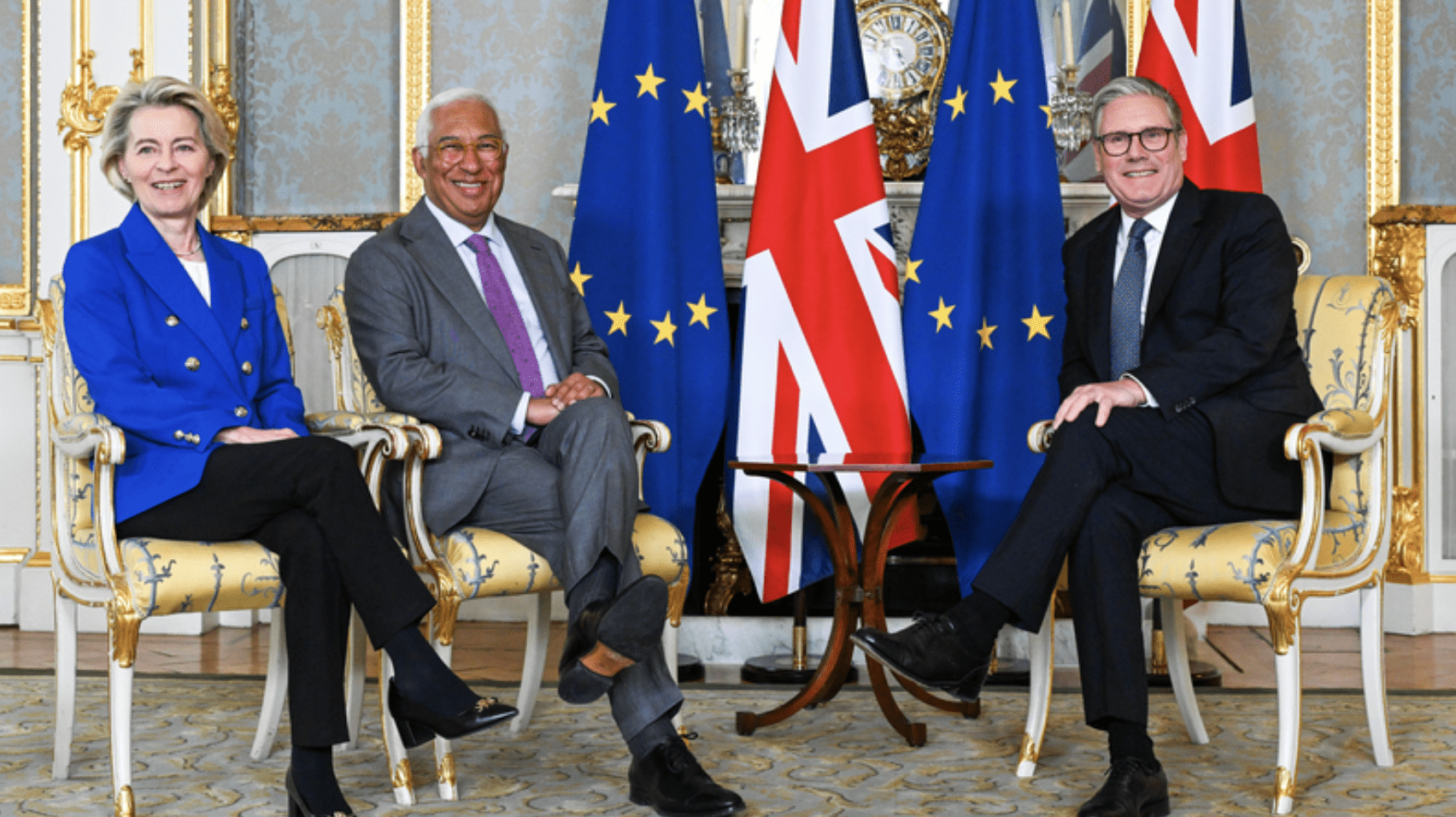A Good Restart
While the proof of the pudding will be, as always, in the eating, the UK-EU 19 May Summit can justly be said to have laid out an enticing menu. A commentary by Sir Alan Dashwood

The “re-setting” of the post-Brexit relationship between the UK and the EU got off to a good start with the Summit on 19 May 2025 between Prime Minister Starmer and the Presidents of the European Commission and the European Council.
The Summit outcome is enshrined in three texts: a Joint Statement; a EU/UK Security and Defence Partnership; and what is described as “A renewed agenda for European Union-United Kingdom Cooperation – Common Understanding”.
These are non-binding, political texts, but no less significant for that; the strength of the commitments undertaken is to be determined by the degree of detail and the language in which they are expressed.
The Joint Statement proclaims the Parties’ agreement to a new Strategic Partnership, listing “global priorities” with continuing support for Ukraine in the forefront.
Summits are to be held on an annual basis, to strengthen the UK/EU relationship and oversee the implementation of the Withdrawal Agreement (WA) and the Trade and Cooperation Agreement (TCA), while “driving progress” on the policy agenda set out in the Common Understanding.
Though not legally binding, the EU/UK Security and Defence Partnership (SDP) is a formal document belonging to a new category of instruments the EU began to conclude with selected third countries in 2024.
It is a substantial text, comparable in scope and ambition to the EU/Norway SDP, while reflecting the UK’s less developed relationship with the Union.
A feature of the new SDP is the range of “dialogue and consultation mechanisms” it establishes. These include “six-monthly foreign and security policy dialogues” (language recognising, like the TEU itself, that foreign and security policy are a continuum) between the EU High Representative for Foreign Affairs and Security Policy (HR) and the UK Foreign and Defence Secretaries; as well as the possibility for the HR, where appropriate, to “invite the UK regularly to EU high level meetings, including at the Council, as appropriate”.
The SDP identifies no less than 21 “areas of cooperation”, some described in significant detail and with clear undertakings to act.
For instance, on “peace building and crisis management”, it is stated that, among other things, “the UK will consider its participation in the EU CSDP civilian and military crisis management” and that “the EU and the UK “will explore the arrangements which could enable such participation”, a clear allusion to the possible conclusion of a Framework Participation Agreement.
While in the crucial area of “security and defence initiatives, policies and instruments”, the SDP refers to “regular” EU/UK exchanges on, and to exploring “possible mutual involvement” in, the Parties’ respective initiatives; to the UK’s participation in the PESCO Military Mobility project; and to exploring possibilities for establishing an Administrative Arrangement between the UK and the European Defence Agency.
The Common Understanding sets out a policy agenda for the Strategic Partnership as a whole. It is expressed to be between the UK and the Commission, rather than the EU, suggesting the agenda’s inchoate nature, as compared with the action programme for security and defence which the SDP lays down.
The brief reference to security and defence in the Common Understanding adds only one element (though an important one) to the SDP, that the UK and the Commission “should swiftly explore any possibilities for mutually beneficial enhanced cooperation created by the SAFE instrument, once adopted”.
In its Introduction, the Common Understanding notes, without further detail or commentary, the controversial (for the UK) “political agreements” reached at the eleventh hour regarding the extension of the arrangements on fishing to 30 June 2038.
For the rest, the Common Understanding contains a series of commitments by the UK and the Commission to explore possibilities for cooperation in a range of fields, notably: they “should work towards a balanced youth experience scheme” (avoiding the politically sensitive phrase “youth mobility” for the UK) and “towards the association of the [UK] to the [EU] Erasmus + programme”; they “should explore in detail the necessary parameters for the [UK]’s participation in the [EU]’s internal electricity market; they “should work towards establishing a link between carbon markets” by way of an agreement linking their respective emissions trading schemes; and they “should work towards establishing a Common Sanitary and Phytosanitary Area” by way of an EU/UK Sanitary and Phytosanitary (SPS) Agreement (thereby removing serious impediments to the trade in animal and plant products).
In addition, regarding law enforcement and judicial cooperation in criminal matters, the Commission and the UK say they “believe that there is scope for reinforcing cooperation through “quicker, better and deeper implementation” of Part Three of the TCA. While they “underline their commitment to deeper cooperation on challenges posed by irregular migration”.
Very interestingly for the future evolution of the UK/EU relationship, in certain policy areas, such as that of a future SPS Agreement, there is acceptance, on the UK’s part, of the need for “dynamic alignment” with EU rules and, on the Commission’s part, that the UK “should be involved at an early stage and contribute appropriately…to the decision-shaping process for [EU] legal acts”.
And there is agreement as to the appropriateness of an arbitration-based dispute resolution mechanism, with the CJEU’s role limited to interpreting EU law.
All things considered, while the proof of the pudding will be, as always, in the eating, the 19 May Summit can justly be said to have laid out an enticing menu.
IEP@BU does not express opinions of its own. The opinions expressed in this publication are those of the authors. Any errors or omissions are the responsibility of the authors.
